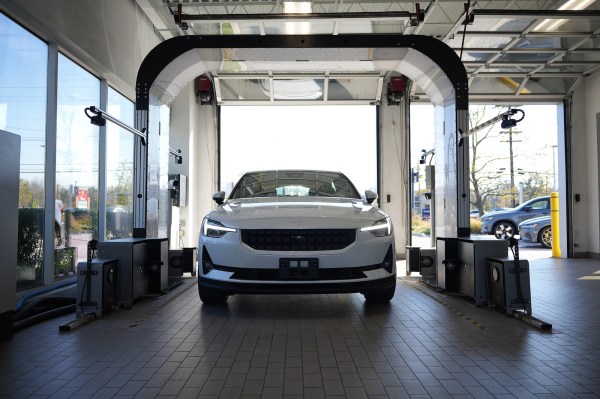UVeye’s automated vehicle inspection technology may have started out as a system to detect security threats, but the six-year-old Israeli startup has found deep interest and investment from the automotive sector.
The company, which uses a combination of computer vision and machine learning to create a system that can quickly and accurately inspect vehicles, has raised $100 million in a Series D funding round led by Hanaco VC, a venture capital firm based in New York and Tel Aviv. Existing investors GM Ventures, CarMax, W.R. Berkley Corporation, F.I.T. Ventures L.P. and Israeli institutional investors also participated in the round that has pushed its valuation to about $800 million, according to a source who spoke to TechCrunch on condition of anonymity.
Since its founding in 2016, the company has raised $200 million in investment capital.
“UVeye saw the opportunity is 2019 as we saw more and more vehicles that had mechanical issues in their undercarriage so although the systems were used for the security side the need was very obvious,” CEO and co-founder Amir Hever told TechCrunch in an email. “The first commercial use case was actually supporting and partnering with the OEMs as part of the new vehicles supply chain, since then we have expanded and today we support the full life cycle of the vehicle, which includes the dealership sector, used cars and auctions, insurance companies and commercial fleets.”
Now, UVeye is doubling down on its automotive bet. The company, which employs about 200 people and is based in New Jersey and Tel Aviv, will use the new funding to start production of its inspection systems in North America and to accelerate sales growth. The company previously announced commercial agreements with General Motors, Volvo Cars USA and CarMax to introduce UVeye technology throughout their wholesale networks.
“Automated inspection of vehicles enabled by advanced computer vision and AI is in its first innings, but will completely transform the auto industry,” Lior Prosor, partner at Hanaco VC, noted in a prepared statement. “As electric and autonomous vehicles become more and more complex and fleets become more difficult to manage, low-cost and high-frequency predictive maintenance will become an essential part of any auto stack.”
Hever said that UVeye’s expansion in North America will bring its inspection technology to thousands of dealerships, used-car auctions and fleets within the next three years. UVeye also has offices in Japan and Germany.
The company developed — and now produces — three types of systems that can inspect new and used vehicles at dealerships, auction or for large fleet operators in just a few seconds and while the cars, trucks and SUVs are moving. An underbody scanner can detect frame damage, missing parts or leaks and its tire system can identify the brand and technical specifications, air pressure, tread depth and sidewall damage within seconds. Its third system provides a 360-degree exterior overview that can check sheet metal and other external body components such as bumpers, door locks, grilles and windows, according to UVeye.
The CEO also sees a longer-term opportunity with robotaxi fleets.
“We definitely see our products as a needed solution for safety and predictive maintenance for autonomous fleets as they will be driving 24/7 on the road and will need continuous support,” Hever told TechCrunch. “We are in touch and working with several companies in the fleet sector, with some of the biggest players in the world and should have some updates on the topic by the end of 2023. As we also see the future the EVs and autonomous vehicles will have more and more sensors, we believe that combining the vehicle sensors and our capabilities will provide a better complete condition report of the vehicle.”
